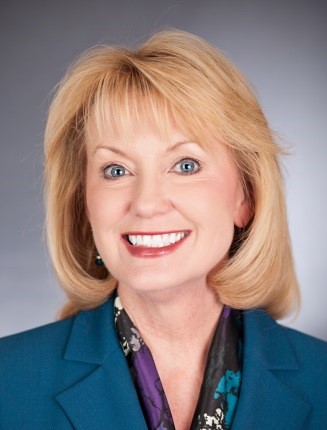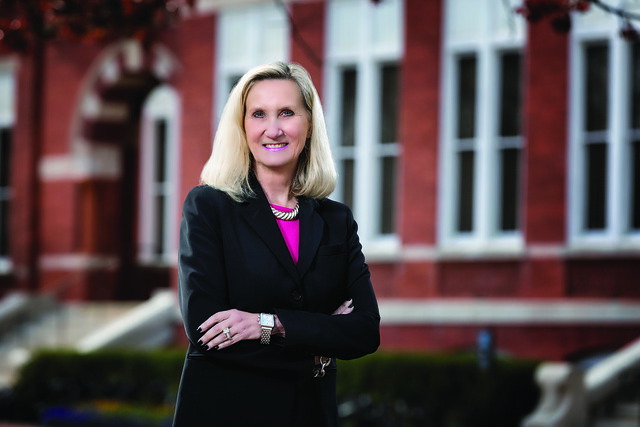Three alumni giving keynotes as Auburn University awards more than 4,000 degrees at spring commencement ceremonies
Article body
Auburn University will confer 4,032 degrees on its new graduates during the institution’s spring commencement ceremonies. Five main ceremonies will be held May 5-7 in Auburn Arena in addition to separate ceremonies May 8 for its two professional schools.
Susan Story, a 1981 graduate and president and CEO of American Water Works, will speak at both Saturday ceremonies. A 10 a.m. ceremony will be held for the Samuel Ginn College of Engineering and University College. A 2 p.m. ceremony will be held for the College of Architecture, Design and Construction, the College of Human Sciences, the School of Nursing and the College of Sciences and Mathematics.
Randall Ennis, a 1983 graduate and CEO of World Poultry Foundation, will give remarks at the Sunday ceremonies. A 1 p.m. ceremony will be held for the College of Agriculture, the College of Education and the School of Forestry and Wildlife Sciences. A 5 p.m. ceremony will be held for the Raymond J. Harbert College of Business.
Melanie Barstad, a 1975 graduate and former president of women’s health for Johnson & Johnson, will speak at a 10 a.m. ceremony Monday for the College of Liberal Arts.
Story has served as CEO of American Water Works—the largest publicly traded U.S. water and wastewater utility company—since May 2014. She spent 31 years at Southern Company, where she served as CEO of Southern Company Services and president and CEO of Gulf Power Company. She serves as the independent lead director for Raymond James Financial and is on the Dominion Energy board of directors. She also serves on the Moffitt Cancer Center Board of Advisors.
Ennis spent more than 30 years in the poultry industry before accepting the position of CEO of World Poultry Foundation in 2015. The nonprofit organization has a mission to solve hunger and poverty issues through the production and consumption of poultry, while empowering farmers. Ennis is active in industry trade associations and has served as the president of the Alabama Poultry and Egg Association. He has also held board seats on the National Chicken Council, the International Poultry Council, the European Primary Breeders Association and the National Poultry Technology Center.
Prior to Barstad’s retirement from Johnson & Johnson, she served as president of women’s health, president of acute care and co-chair of the company’s global women’s leadership initiative. While president of acute care, she had oversight of revenues driving growth for the company’s largest and most strategic customers. In this role, Barstad led an enterprise-wide contracting initiative identifying significant cost savings while avoiding compliance risk. Barstad currently serves on the Cintas board of directors, and she recently served on the Auburn University Foundation board of directors.
Auburn will award 89 doctoral degrees, 695 master’s degrees, four education specialist degrees, 141 pharmacy degrees, 120 veterinary medicine degrees and 2,983 bachelor’s degrees. The bachelor’s degrees by college and school are: Raymond J. Harbert College of Business, 676; Samuel Ginn College of Engineering, 571; College of Liberal Arts, 524; College of Education, 301; College of Sciences and Mathematics, 299; College of Architecture, Design and Construction, 149; College of Agriculture, 147; College of Human Sciences, 136; School of Nursing, 97; School of Forestry and Wildlife Sciences, 57; and University College, 26.
Related Media
Media interested in this story can contact Communications Director Preston Sparks at (334) 844-9999 or preston.sparks@auburn.edu.
Auburn University is a nationally ranked land grant institution recognized for its commitment to world-class scholarship, interdisciplinary research with an elite, top-tier Carnegie R1 classification, life-changing outreach with Carnegie’s Community Engagement designation and an undergraduate education experience second to none. Auburn is home to more than 30,000 students, and its faculty and research partners collaborate to develop and deliver meaningful scholarship, science and technology-based advancements that meet pressing regional, national and global needs. Auburn’s commitment to active student engagement, professional success and public/private partnership drives a growing reputation for outreach and extension that delivers broad economic, health and societal impact.







